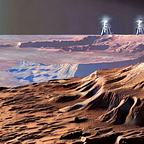The Next Chapter in Space Travel: Harnessing Artificial Intelligence for Interstellar Missions
Since the dawn of humanity, we have gazed up at the stars, imagining the wonders that lie beyond our own world. With recent advancements in space travel and technology, we’re closer than ever to unlocking the secrets of the universe. But what if we could take it one step further? What if we could harness the power of artificial intelligence (AI) to embark on interstellar missions, exploring the furthest reaches of space?
In this article, we’ll explore how AI is revolutionizing space travel and unlocking new possibilities for humanity’s journey among the stars.
AI: An Essential Partner in Modern Space Travel
As space travel becomes more advanced, the challenges we face also increase in complexity. From navigating through hazardous cosmic debris to managing the limited resources available during long-duration missions, there is a need for a new kind of assistance: AI.
AI has the potential to transform every aspect of space travel. By processing vast amounts of data and making decisions in real time, AI can help astronauts navigate more efficiently, conserve resources, and even identify new opportunities for exploration. As we continue to push the boundaries of what’s possible in space travel, AI will play a crucial role in helping us achieve our goals.
Navigating the Cosmos: How AI Can Help Us Find Our Way in Space
Navigating through the vastness of space is no easy feat. With countless celestial bodies, debris, and other hazards to avoid, a small miscalculation can have disastrous consequences. This is where AI comes in.
By processing data from various sensors and instruments, AI can help guide spacecraft through the cosmos, making real-time adjustments to trajectory and speed. This not only increases the efficiency of space travel but also helps to ensure the safety of astronauts onboard.
AI-Powered Robots: Expanding Our Reach in Space
As we venture deeper into space, it’s important to recognize that human beings aren’t always the most suitable explorers for certain environments. AI-powered robots can help bridge the gap, going where humans cannot, and making discoveries that would otherwise be impossible.
These AI-driven machines can conduct research, perform maintenance, and even construct habitats in space, all while learning and adapting to new environments. As we continue to explore the cosmos, these AI companions will become invaluable assets in our quest for knowledge and discovery.
AI and Space Travel: Uniting in the Search for Extraterrestrial Life
One of the most exciting possibilities for AI in space travel is its potential to aid in the search for extraterrestrial life. By analyzing data from telescopes, satellites, and other instruments, AI can identify patterns and anomalies that may be indicative of life beyond Earth.
As we expand our search for extraterrestrial life, AI will play a key role in sifting through the vast amounts of data, helping us uncover the secrets of the universe and answering one of humanity’s oldest questions: are we alone?
In Conclusion: The Future of Space Travel and AI
As we look to the future of space travel, AI will undoubtedly play a central role in helping us explore the cosmos. From guiding spacecraft through treacherous terrain to assisting in the search for extraterrestrial life, AI holds the key to unlocking new frontiers in space exploration.
With the continued advancement of AI technology, we can expect even more groundbreaking discoveries and achievements in the realm of space travel. As we embark on this next chapter in our journey among the stars, AI will be right there with us, ensuring a brighter and more exciting future for humanity.
Like the article? Don`t forget to follow us on Medium! Also interesting content on our Instagram, Facebook, and Twitter!
